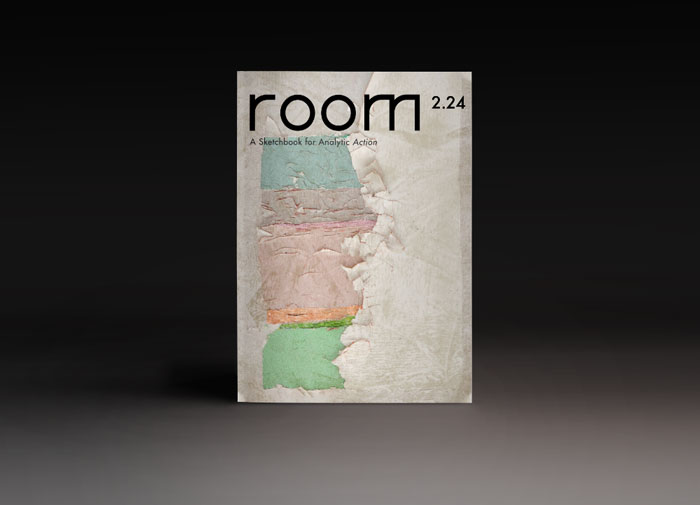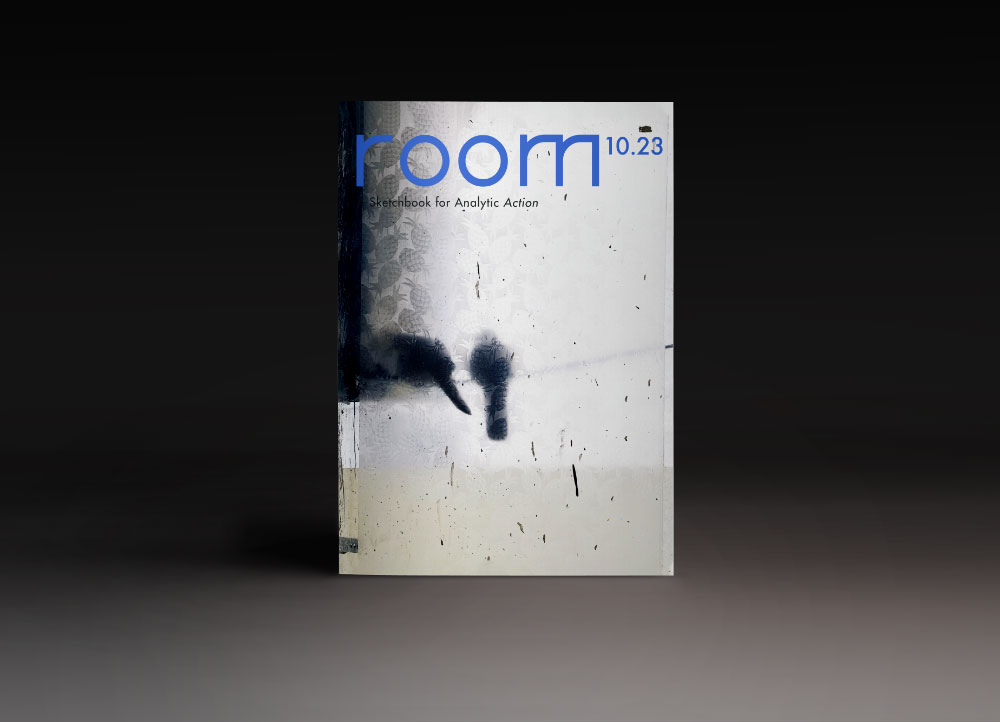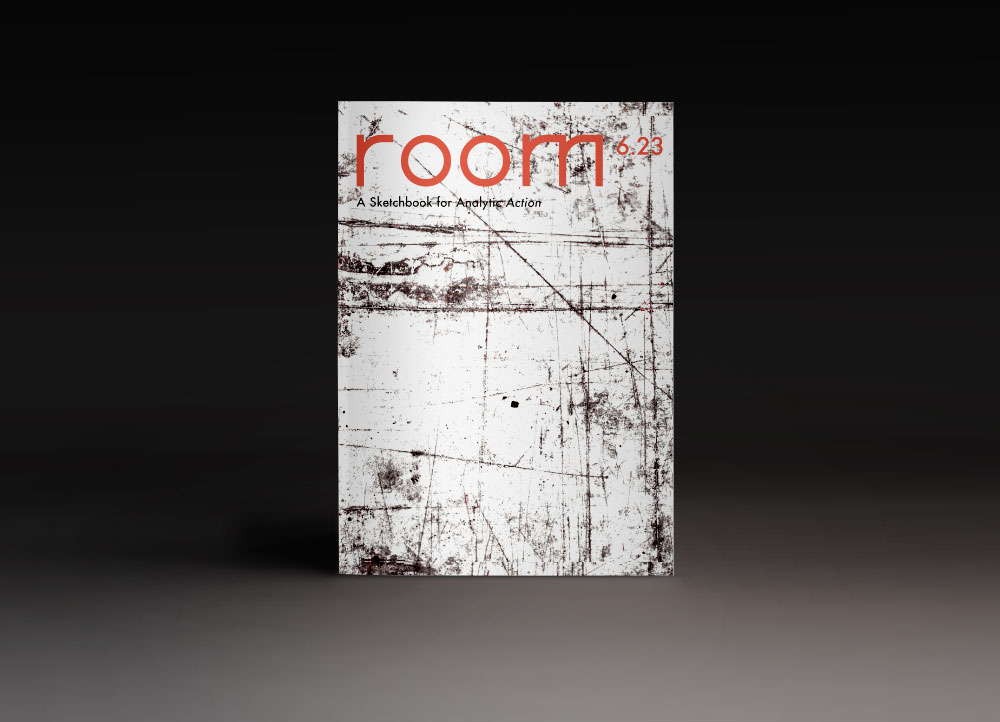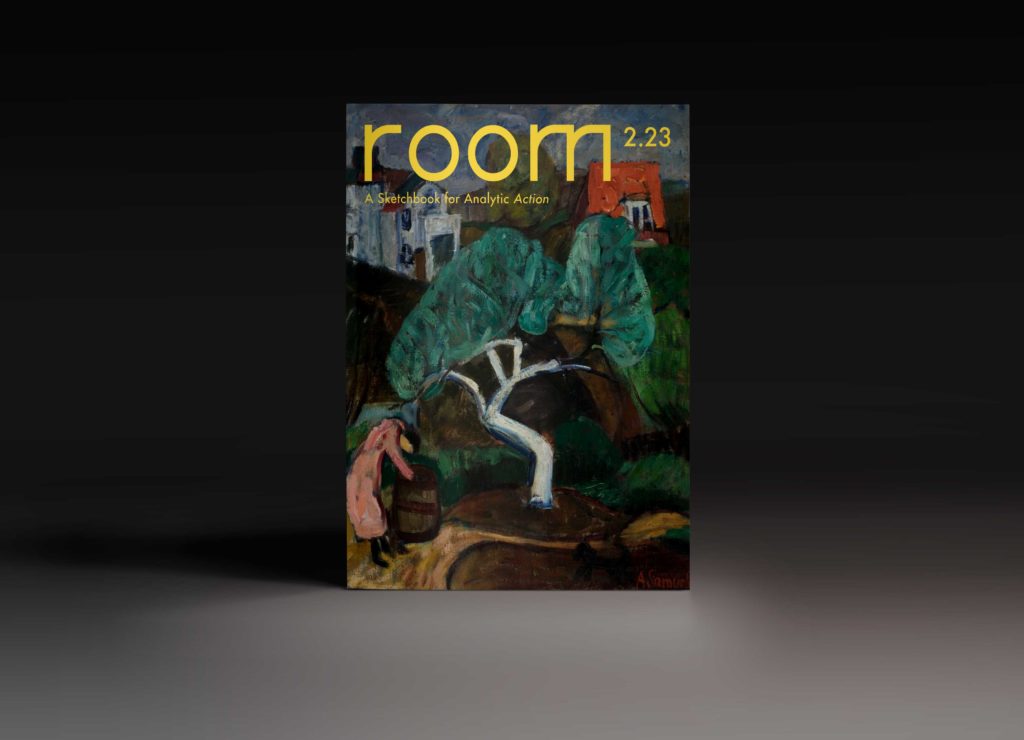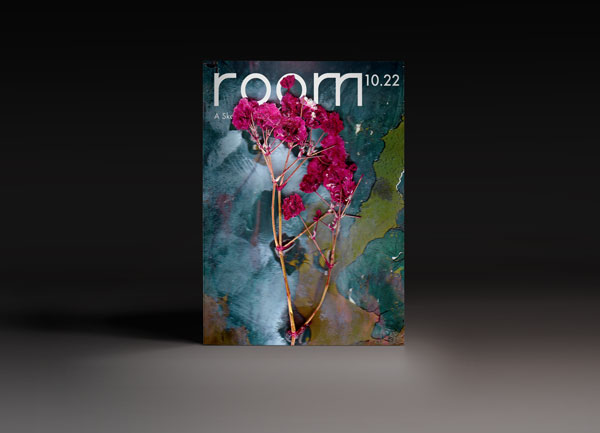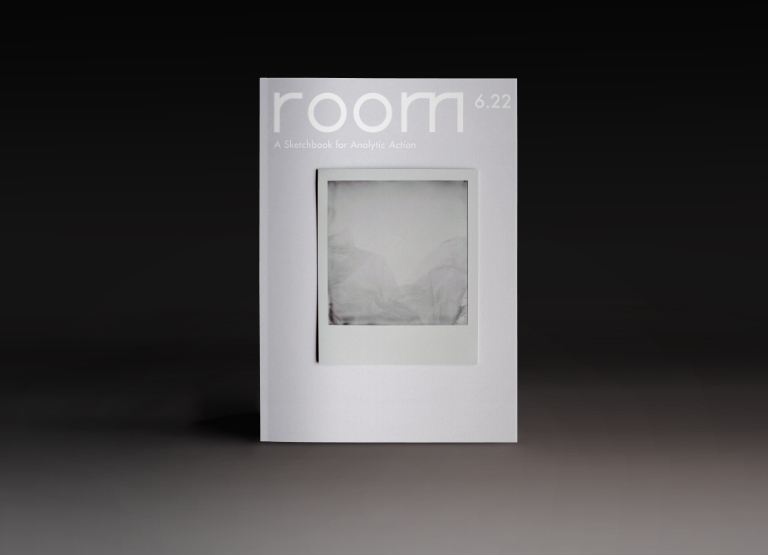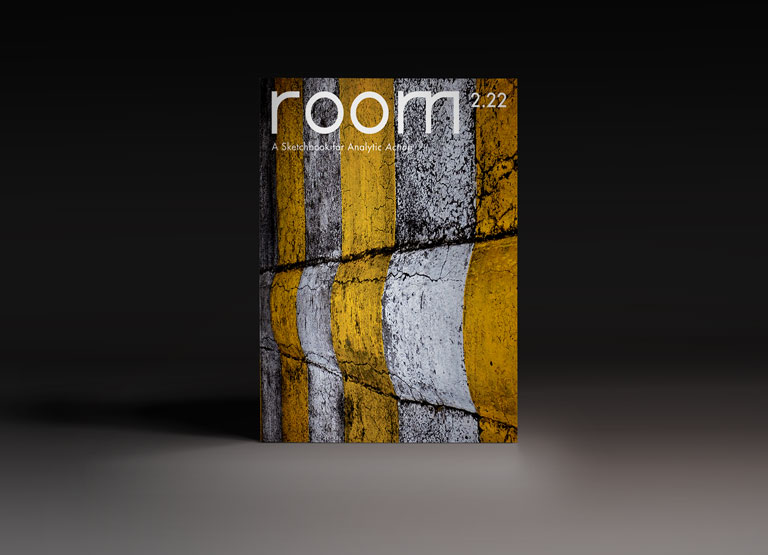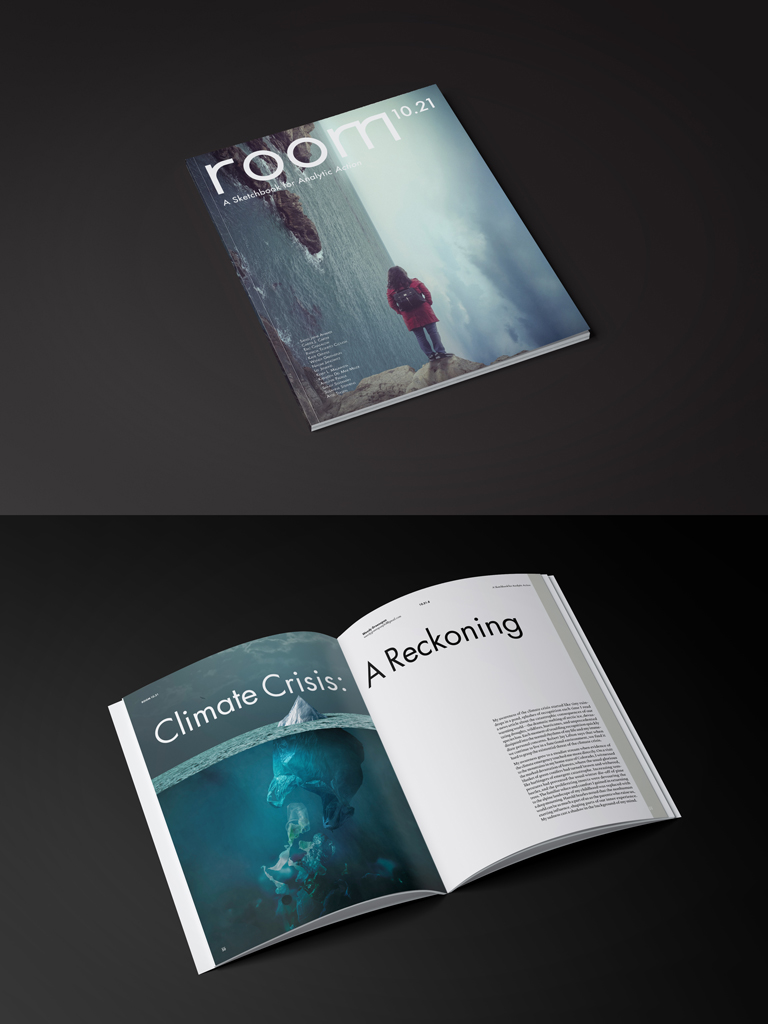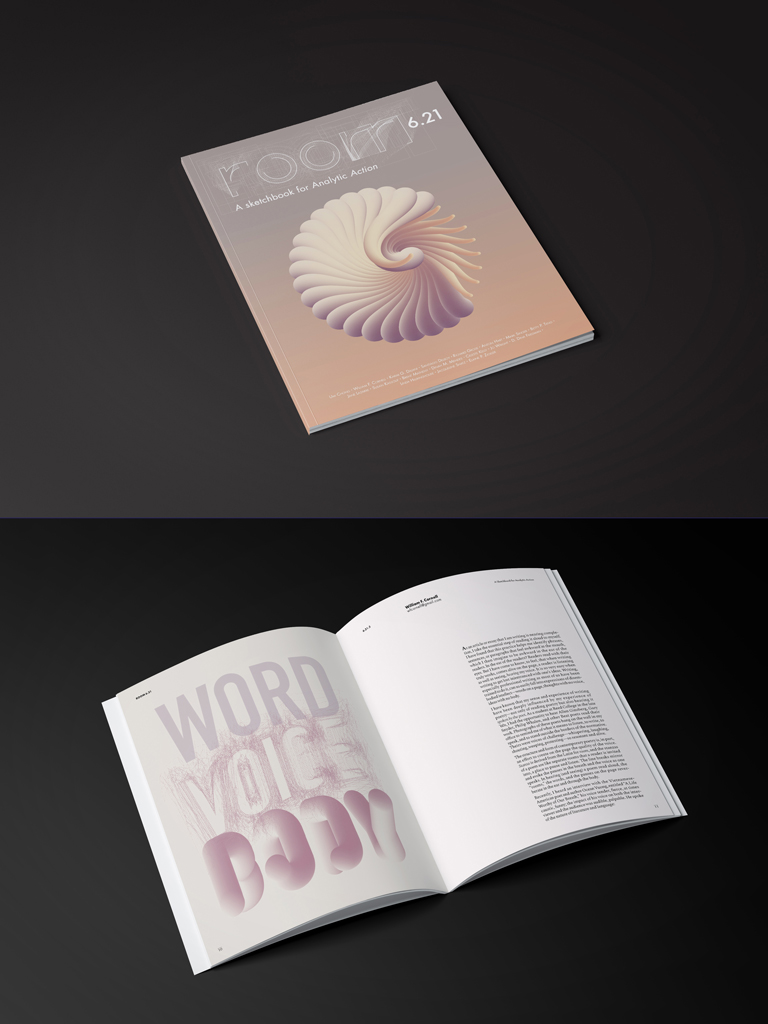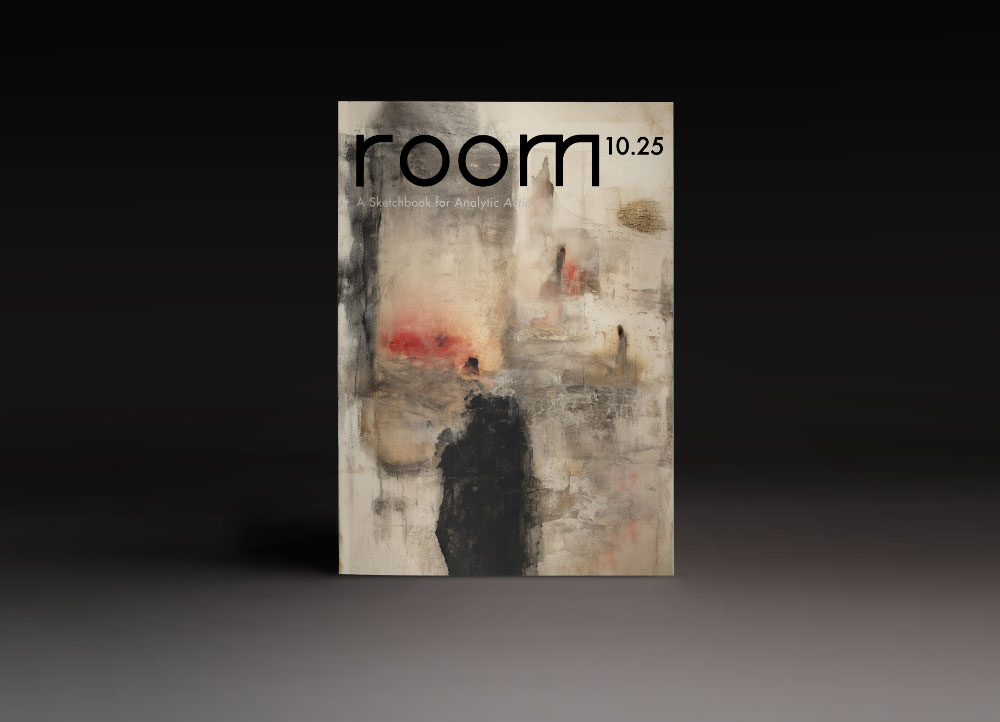
ROOM 10.25
Overwhelm
ROOM is a sketchbook for analytic action, and toward this end, my editorials have paralleled the action of psychoanalytic interpretation by recognizing common threads and highlighting the underlying themes that connect different voices from all over the world. In this way, the significance of each issue is brought to the surface and marks another discrete moment in ROOM’s living analytic archive.
The essays in ROOM 10.25 are as raw and urgent as any we have received. Their authors hail from Sudan, Palestine, Israel, Croatia, and the US. They write about what it feels like to be living a split screen. They write about how we split words from context. They write from inside a refugee camp in Gaza and from inside the federal building in New York. They write about children—their own and ours. There is no single thread to hang on to. There is no center that holds.
There are times in our work as analysts when silence is called for, when to say anything is to say too much. Finding strength to bear witness and to bear our broken hearts is also analytic action.
Contributors
Dr. Mohamed Omran Abu Shawish • Dr. Azz a-Din • Heba Al-Turk • Dana Amir • Nan Cohen • Patrick Cole • Caleb Cobra Cornell • Karim G. Dajani • Mira Erlich-Ginor • Eiman Hussein • Susan Cortilet Jones • Celeste Kelly • Natasha Kinsella • Irwin Kula • Oleksandra Kurbala • JT Mikulka • Sonni Mun • Joyce Pommer • Jyoti M. Rao • Cynthia Sparrenberger • Dr. Helena Vissing • Andrea Luka Zimmerman
ROOM 10.25 is available at most online book retailers around the world, including:
-
- Australia: booktopia.com.au
- Europe/UK: amazon.co.uk
- Germany: hugendubel.de
- Korea: yes24.com
- Sweden: bokus.com
- Don’t see your country listed? Try your favorite local bookseller—or click here to order from Amazon, which ships worldwide so you can get your copy wherever you are.
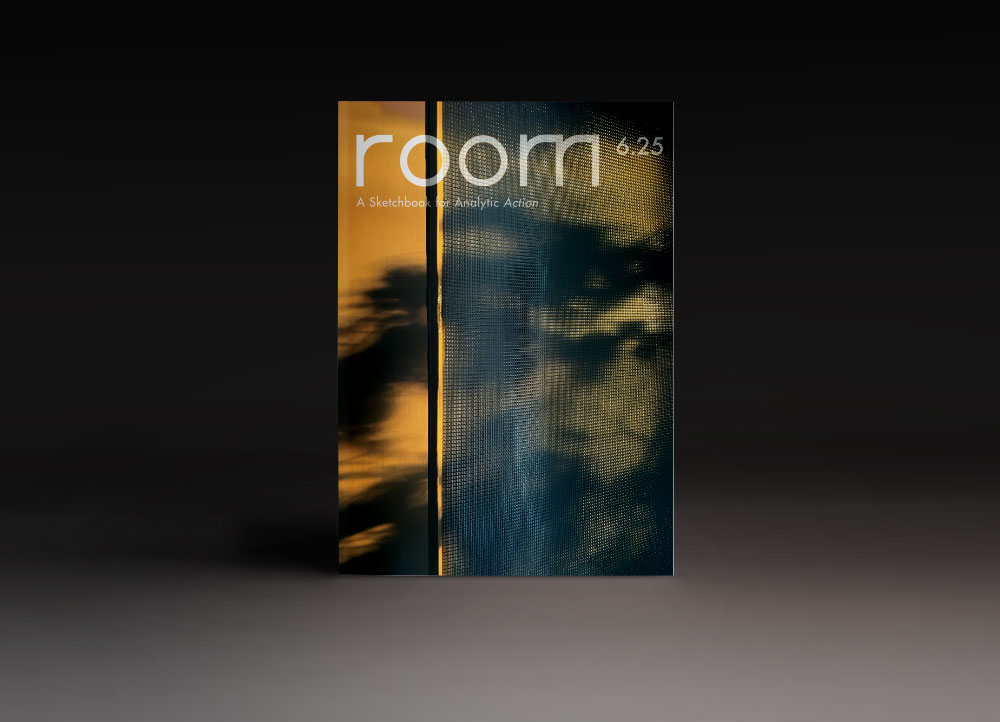
Available Worldwide!
ROOM 6.25
The Writing on The Wall
Each of the writers in ROOM 6.25 has captured, in their own way, something of this extraordinary moment we are all living through. This is not easy. In his essay Why I Write, Thomas Ogden explains why. “Part of the difficulty of writing well lies in the fact that writing any sort of analytic essay, literary essay, poetry, fiction is autobiographical,” Ogden writes; “I must find a way of capturing a situation in my own way, a way that bears my own mark.” This unique issue of ROOM bears the mark of multitudes and holds the scars of generations.
In It Doesn’t Start with Prisons: A Psychotherapist’s Warning About Silence, Kissu Taffere writes, “Each act of political violence ripples through generations, leaving traces in both flesh and memory.” Born during Ethiopia’s Derg “Red Terror,” Taffere has “seen blood on people before it’s dried, seen evidence of torture laid out for documentation.” She is imploring us to see how “institutional erosion often starts with these small, seemingly insignificant acts of enforced conformity.” She knows. She has lived it.
…
Contributors
ROOM 6.25 is available at most online book retailers around the world, including:
-
- Australia: booktopia.com.au
- Europe/UK: amazon.co.uk
- Germany: hugendubel.de
- Korea: yes24.com
- Sweden: bokus.com
- Taiwan: books.com.tw
- If your country isn’t listed above, please check your local bookseller’s website for availability, or order through Amazon.
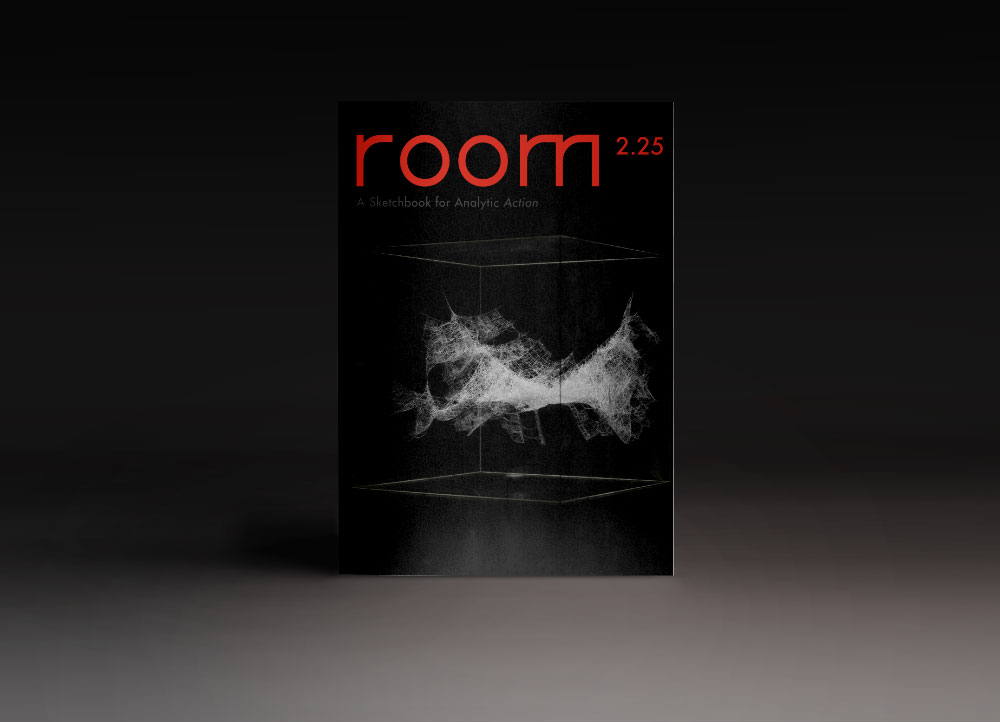
Available Worldwide!
ROOM 2.25
In the Midst
The writers and artists in ROOM 2.25 bear witness to what must happen in ourselves, our communities, and our political movements for truth to be faced and change to occur. Some write from amidst genocide, others from their country’s fascist turn, and still others from the impact of environmental catastrophe. Each of these life-threatening events inscribes itself differently on our souls. We live in terrifying times.
Hala Al Sarraj’s Will the Sun Rise Again in Gaza?, Mohamed Omran Abu Shawish’s For How Long!? From Gaza, Yianna Ionnaou’s Our Guernica, and Sahar Vardi’s Activating Hope in Dark Times come to ROOM through a network of colleagues, committed to justice, equality, and human rights who have been working closely with practitioners on the ground in Israel/Palestine and Gaza.
From Al-Aqsa Martyrs Hospital Abu Shawish writes, “each loss has cut deeply, each unique and irreplaceable. [… ] Every time I feel the pull to surrender, to collapse under the immense weight of my grief and exhaustion, I remind myself of all those who have anchored their strength within me (They planted the stakes of their resilience within my ribs).” Leaving her home in Gaza City, Al Sarraj recalls, “Many times, we felt it was the time for us to die. […] Entire families were erased from the records. […] What reactions should we have to all of that? What amount of emotions and tears? What yelling and shouting should be heard? Will our hearts keep beating?” And from the West Bank, Vardi adds, “Seeing society shed all compassion and take pride in these crimes is enough to drive any heart to despair…(but) resisting despair is not enough. Activism and resilience require hope.”…
Contributors
Manal Abu Haq • Mohamed Omran Abu Shawish • Nandini Bhattacharya • Mary Buchinger • Ipek S. Burnett • Anastasios Gaitanidis • Alastair Huntley • Yianna Ioannou • Mohamad Kebbewar • Rina Lazar • Keli Safia Maksud • Maya Mukamel • Maximilian Römer • Judy Roth • Ann Shenfield • Chiharu Shiota • Sahar Vardi
ROOM 2.25 is available at most online book retailers around the world, including:
-
- Australia: booktopia.com.au
- Europe/UK: abebooks.co.uk, amazon.co.uk
- Sweden: bokus.com
- Taiwan: books.com.tw
- Please check your local bookstore’s website for availability, or order through Amazon.
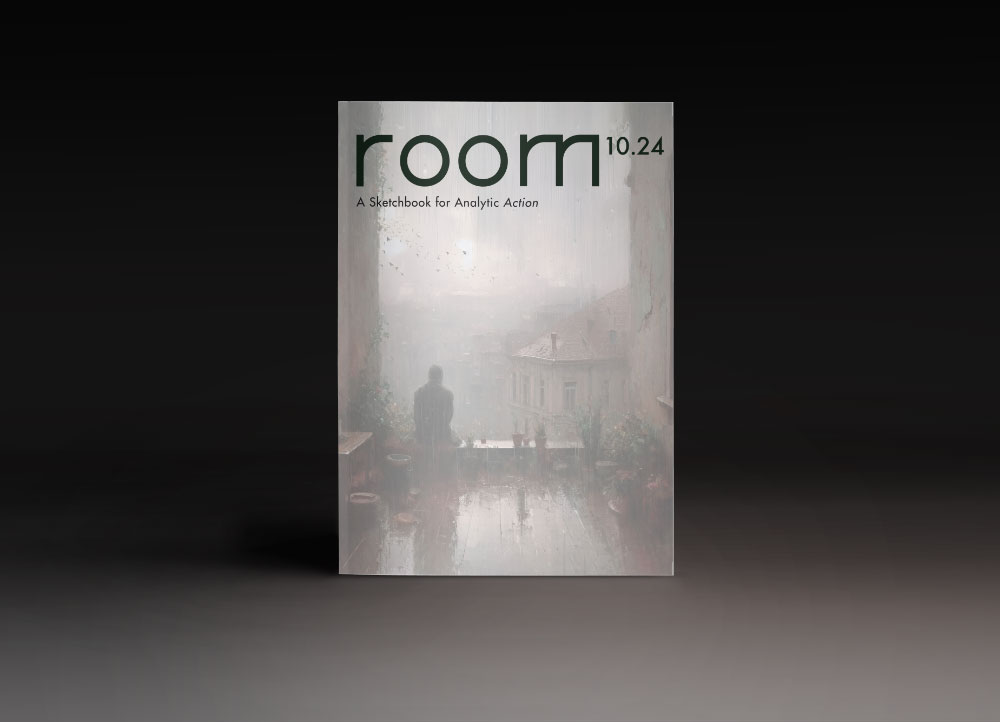
Available Worldwide!
ROOM 10.24
Editorial: Toward a New Collectivity
In Kara Walker’s words, “history is the oft-repeated fable; power is the oft-repeated script.” From Walker’s art in The High and Soft Laughter of the Nigger Wenches at Night, In the Colorless Light of Day, to Karim Dajani and Eyal Rozmarin’s conversation in Speaking of Home: An Intimate Exchange on Israel-Palestine, ROOM 10.24 is a testament to our collective heartbreak and resilience. Exactly one week after the 2016 US election, we created ROOM: A Sketchbook for Analytic Action. We knew that to “live out,” in Sartre’s words, “that unbearable, heart-rending situation known as the human condition in a candid unvarnished way,” we needed to do it together. For the last eight years, ROOM’s worldwide community has engaged in a collective struggle for recognition and authenticity across generations, culture, and political pressure. Now, just one week after the re-election of Donald Trump, ROOM 10.24 could not be more prescient. Aicha Bint Yusif’s poem, Bread and Salt, which opens this issue, harkens back to the place in Dante’s journey where his ancestral grandfather forewarns the pilgrim that in exile he will come to know the bitter salt of another’s bread, and the hardship of climbing another’s stairs. …
Contributors
Ali Asadollahi • Stefania Baresic • Katie Burner • Karim G. Dajani • Sue Grand • Susan Greene • Richard Grose • Shifa Haq • Michael Krass • Mary B. McRae • Nancy Prendergast • Eyal Rozmarin • Sara Mansfield Taber • Kara Walker • Aicha Bint Yusif
ROOM 10.24 is available at most online book retailers around the world, including:
-
- Australia: booktopia.com.au
- Europe/UK: amazon.co.uk
- Italy: ibs.it
- South Korea: kyobobook.co.kr
- Sweden: bokus.com
- Taiwan: books.com.tw
Online book retailer with worldwide shipping:
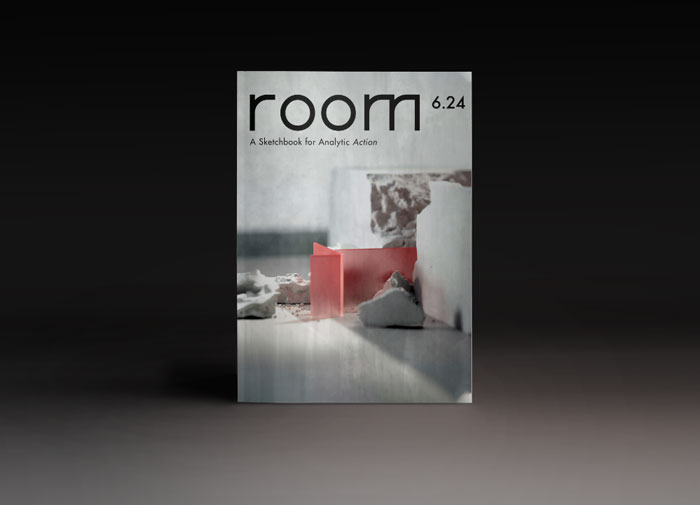
Available Worldwide!
ROOM 6.24
Editorial: These Words
“Think what it would be like,” Italo Calvino wrote, “to have a work conceived from outside the self, a work that would let us escape the limited perspective of the individual ego, not only to enter into selves like our own, but to give speech to that which has no language… ” Of course we know that no person and no theory can ever escape the limited perspective of Calvino’s “individual ego.” Taken together, however, the authors and artists in ROOM 6.24 are giving language to a world that is rendering us all increasingly speechless.
In You Know How Mami y Papi Get, Eliza Jaquez finds ways to enliven the dry universality of psychoanalytic concepts. She describes being stopped in her tracks by a term like “object relations”: “This (psychoanalytic) language palette is significantly muted when compared to the vibrant magentas coating my English or the bursts of flamingo pink saturating my Spanish,” she writes, “but once I walk through that linguistic portal, my homegrown blend of Spanish serves as a reminder that on this side of the looking glass, we are not objetos. We are gente.”
When they take the psychoanalytic terms “transference” and “interpretation” onto a South African farm or onto US college campuses, Mark Solms and Jyoti Rao also are also walking us through a “linguistic portal.” In Student Activism as Interpretation Rau explains how the work of social justice activists functions like psychotherapy when activists are “imploring us to attend to our collapsed and curtailed capacity for love.” She connects the attributes of psychoanalytic interpretation: introjection, catharsis, insight, identification, and working through to social justice activism in universities. Channeling Freud’s 1915 monograph Why War, Rau reminds us that “We must find a way to differentiate ourselves from the compelling calls of the past … and be able to bear standing too close to the great changes ….”
Contributors
Charles Byrne • Karim G. Dajani • Richard Grose • Tom Hennes • Eliza Jaquez • Sue Kolod • Nancy Kuhl • Arsalan Malik • Abidemi Olowonira • Jyoti M. Rao • Eyal Rozmarin • Ray Smith • Mark Solms • Jamie Steele • Lisa Zimmerman
ROOM 6.24 is available at most online book retailers around the world, including:
-
- Europe/UK: amazon.co.uk
- South Korea: kyobobook.co.kr
- Sweden: bokus.com
Online book retailer with worldwide shipping:
ROOM 2.24
Editorial: Beginnings
“…Karim and I are planning to meet tomorrow…to see what we might do together. I’m guessing we’ll have some ideas. I—we—will be in touch.” —Eyal
“…We need a new language, a new ideology, a new analytic praxis… The responsibility to help move in this direction is on our shoulders. Who is going to do it if not for us? And yet, it is like trying to build the pyramids of Giza. Unimaginable.” —Karim
As kids, Karim Dajani and Eyal Rozmarin grew up within hours of each other, one in Beirut, the other in Tel Aviv—to parents who were born in what had been Palestine/Israel. From an astute understanding of the unconscious process, they have written, separately, about belonging and unbelonging and about the interpolation of culture on our beings. Now they meet, for the first time, to write about the impact the current catastrophe in their homeland is having on their souls, about the trauma and resilience in their families’ histories, and about the relevance of psychoanalytic thinking today. In a profound illustration of “analytic action,” Dajani and Rozmarin are embarking together on a project that they hope will culminate in a new angle from which to understand our human condition.(…)
Contributors
Shari Appollon • Ann T. Augustine • David Bloch • Aaron Bourne • Karim G. Dajani • Mohamad Khayata • Delia Kostner • Adrienne Pilon • Eyal Rozmarin • Jill Salberg • Lava Schadde • Sara Shaheen • Isaac Slone • Katherine J. Williams
ROOM 2.24 is available at most online book retailers around the world, including:
-
- Australia: booktopia.com.au
- Europe/UK: amazon.co.uk
- South Korea: kyobobook.co.kr
- Sweden: bokus.com
Online book retailer with worldwide shipping:
ROOM 10.23
Editorial: From Hand to Hand
“It turns out that when you meet the president of the United States, you are not allowed to have anything in your hands or your pockets, so the fact is I couldn’t show President Biden Shegofa Shabazz’s ‘Letter to the UN’ published in ROOM 6.23. I could only tell him about it,” Layne Gregory wrote to me, correcting a rumor that had been buzzing about. Layne Gregory is one of the founders of the Asian University for Women’s program Writing for Friendship.
None of us, and perhaps least of all Shegofa, ever imagined that her “Letter to the UN” (which had been rejected by at least four different magazines and newspapers before we published it) could have had such reach. Nor could we have imagined that within weeks the IPA UN subcommittee would invite Shegofa to speak to them, register a formal human rights complaint on her behalf, and work actively to find other platforms to amplify her voice.
ROOM is more than a magazine. It was conceived as a psychoanalytically informed community platform following the 2016 US election. Our editorial process is unique. In keeping with our belief that lasting change can only happen from the ground up, we open our doors and wait for readers to write. We never know, from issue to issue, what will rise to the surface of our collective consciousness. Like Shegofa, the authors of ROOM 10.23 are hoping against hope that their words, which are so particular to their separate histories and psychologies, might be heard, might have an impact.
Contributors
John Alderdice • Abdel Aziz Al Bawab • William F. Cornell • Jan Cunningham • Laine Derr • Janet Fisher • Robert Frey • Carole Geithner • Dean Hammer • Admire Kamudzengerere • Marilyn Kohn • Alice Lombardo Maher • Alberto Minujin • Diana E. Moga • Fasasi Abdulrosheed Oladipupo • Eric Shorey • Josephine Wright • Elle Wynn
ROOM 10.23 is available at most online book retailers around the world, including:
-
- Australia: booktopia.com.au
- Europe/UK: amazon.co.uk
Online book retailer with worldwide shipping:
ROOM 6.23
Editorial: Gateways
“It has been almost two years since we were waiting for you to take action. We expected you to not be just a viewer,” Shegofa Shahbaz wrote to the UN. But because she wasn’t sure the UN would read a letter written by a twenty-year-old college student sent on behalf of all the Afghan girls whose lives have been shattered, Shahbaz sent it to ROOM, hoping we might publish it, hoping it might find its way to the UN. Of course we will publish it, we told her. We will publish it in English and Dari so that other Afghan girls might find strength and hope through these words that they might be heard—that they will be recognized.
In their “portrait of an analyst as a young man,” Murad Khan shows us how, from an early age, they also had to learn how to recognize and thread a needle through precarious forces. “We are all caught in a three-dimensional matrix, under forces that push us in different directions depending on the context we’re in at any given moment,” writes Khan in “Re/calibrating” their quilted memoir of surviving family, country, medical school, and professional community. From Jerusalem, Naftally Israeli describes the seemingly insurmountable forces that have pushed his homeland into “apparent madness.” From the prophet Isaiah to the analyst Donald Meltzer, Israeli’s essay, “From Exclusion to Erasure,” delves into the heart of darkness, a crazy quilt that has become Israel. “A complex and integrated view of the truth cannot be maintained by excluding entire swaths of the population from ethical (not just ideological) recognition,” he writes. “For recognition to be truly ethical […] it should be translated into action.” For Israeli, ethical action in his country must translate into new legal definitions relevant to unrecognized minority groups, new forms of political representation, and redistribution of resources.
Contributors
Libby Bachhuber • Catherine Baker-Pitts • Philip Brunetti • Richard Grose • Mirjam Meerschwam Hadar • Matt A. Hanson • Naftally Israeli • Anaís Martinez Jimenez • Murad Khan• Destiney Kirby • Linda Michaels • Mia Muratori • Stephanie Niu • Diane Raptosh • Chaim Rochester • Shegofa Shahbaz • Reuben Sinha
ROOM 6.23 is available at most online book retailers around the world, including:
- Australia: booktopia.com.au
- Europe/UK: amazon.co.uk
- Sweden: bokus.com
Online book retailer with worldwide shipping: - Amazon
ROOM 2.23
Editorial: Navigating Care
Eighty years ago, Albert Camus wrote, “I want to express by means of the plague the suffocation from which we all suffered and the atmosphere of threat and exile in which we lived. At the same time, I want to extend this interpretation to the notion of existence in general.” The chorus of interlocking voices heard in ROOM 2.23 echoes Camus’s experience of suffocation, exile, and threat while challenging us to revisit the “notions of our existence” and make new use of what we find.
“What is it that makes us worry or wonder about each other? What are we tracking for?” Keiko Lane asks in “Viruses, Vaccines, and Proximities: A Story in Five Scenes.” “It’s the evolution of a kind of queer epidemiological cruising. A relationship to risk. A relationship to proximity. Each virus,” she writes, “asks something different from us in how we navigate care and contact. They overlay each other, multiplying in complexities.”
The authors in ROOM 2.23 open the playing field and suggest that not just each virus but each war and each migration “multiply in complexity” and ask for something different from us.(…)
Contributors
Zoe Beloff • Karim G. Dajani • Forrest Hamer • Limor Kaufman • Keiko Lane • Debra Fried Levin • Era A. Loewenstein • Mireille El Magrissy • Kerry L. Malawista • Kim Curts Mattheussens • David Morse • Eric Muzzy • Mia Pixley • Rachael Peltz • Diane Raptosh • Annita Sawyer • Francesca Schwartz • Cathy Sunshine • Sara Mansfield Taber • Elizabeth Wallace, MD • Micki Wierman
ROOM 2.23 is available at most online book retailers around the world, including:
ROOM 10.22
Editorial: Social Dreaming
There is a “deep and somber unity” when the different impressions of our senses enter into “correspondence.” So writes the French philosopher Gaston Bachelard in his seminal book The Poetics of Space. It is this “correspondence” that allows us to receive and transform the immensity of the world into the intensity of our intimate beings. There is an intimate “every- dayness” that runs through all the essays in ROOM 10.22. And much as residual impressions from the day are trans- formed nightly into dreams, the synergy of these writers forms an unsettling social dreamscape.
Svitlana Matviyenko’s day began at five in the morning on the 181st day of the war, a day before Ukrainian In- dependence Day. “Everything here is now immersed in a complete silence that you can only encounter in a small town like mine…The rocket attacks are most typical at this hour. When they are detected by our national radar system, the entire river canyon is filled with the wailing sound of air raid alerts.” In her essay, August 23, 2022— Kamianets-Posilskyi, Matviyenko recounts the events of a day laced with horror and anxiety. “Many of us here in Ukraine are bracing ourselves for tomorrow,” she writes. Her accompanying soundscape brings the birds, the river canyon, and the crescendo of the early-morning air raid from her window straight into ours.(…)
Contributors
Kevin Barrett • Joanne Brooks • Michael Eigen • Terri Greco • Roa Harb • Adrienne Harris • Eugene Mahon • Svitlana Matviyenko • Sebastian Thrul • Isaac Tylim • Grace Bakst Wapner • Jiameng Xu • Elaine Zickler
ROOM 10.22 is available at most online book retailers around the world, including:
- Australia: booktopia.com.au
- Europe/UK: amazon.co.uk
- Sweden: bokus.com
Selected online book retailers with worldwide shipping: - Amazon
- Blackwell’s
ROOM 6.22
Editorial: Breaking Through
“Nowadays, I am acutely aware of the power of transgenerational trauma that has come to life in new circumstances. I feel like it’s getting scary to speak openly. This is what was passed down to me from my ancestors from the USSR, what the people already lived during the oppressive Stalin years.” Finding a Voice recounts a special day in the life of Elena Ozerova: her ten-year-old son’s graduation from elementary school. “Last week,” she writes, “my son asked me to explain what is happening between Russia and Ukraine. He wants to know: Are we good or bad? Are we attacking or defending? My son is no longer a small child but not yet an adult. He wants to draw together with his classmates, write letters (to the soldiers), be a good kid and send sweets to the defenders of the country. He wants to feel like a part of something good.”
Ozerova writes from Moscow, but as a mother, she could easily be writing these words from New York, Jerusalem, or Kabul.
“The country he dreams of being a part of is kind and noble, driven by justice and dignity, where people live in peace and travel the world…I love my son very much and I love my country, but to my regret, this ideal country has never existed.” Ozerova’s anguish is being felt the world over. (…)
Contributors
Daniela Andronache • Deborah Dancy • Lia Dostlieva • Elizabeth Cutter Evert • Linda Hillringhouse • Levas Kovarskis • Nancy Kuhl • Jeanne Parr Lemkau • Ellen Luborsky • Mary Mykhaylova • Lavinia Munteanu • Elena Ozerova • Doug Pagitt • Cosimo Schinaia • Olga Shtonda • Erin Trapp
ROOM 6.22 is available at most online book retailers around the world, including:
- Australia: booktopia.com.au
- Europe/UK: amazon.co.uk
Selected online book retailers with worldwide shipping:
- Amazon
- blackwells.co.uk
ROOM 2.22
Editorial: Struck Anew
Shock occasions change. Five years ago ROOM flashed into being as an immediate response to the 2016 US election. Psychoanalysts who had never written before felt compelled to write.
ROOM has remained a participatory community platform, grounded in a psychoanalytic understanding of how change happens. Each issue archives a new moment. Each is a “working-through” of that which has already passed.
But now we are struck anew. Russia’s invasion of Ukraine occurred during the final weeks of production of this anniversary issue. Still, the questions posed by the contributors in ROOM 2.22 are eerily prescient and speak collectively for all of us. Each looks toward a future none can envision. (…)
Contributors
Abdulmueed Balogun • Jorgelina Corbatta • Fang Duan • Elizabeth Kandall • Ryan LaMothe • Jeanne Parr Lemkau • Kyrie Mason • Christina Nadler • Kelin Perry • Ashley Renselaer • Shelley Rockwell • Loren Sobel • Liliana Zavaleta
ROOM 2.22 is available at most online book retailers around the world, including:
- Australia: booktopia.com.au
- Sweden: bokus.com
Selected online book retailers with worldwide shipping: - Amazon
- blackwells.co.uk
ROOM 10.21
Released: December 2021
Editorial: Solastalgia
“Ever since college, I have had only one goal: to become minister of education and change the system in Afghanistan […]. I have worked so hard to reach this goal. Every night before going to sleep, I imagined myself in a ministry chair as secretary of education, but now I find myself imprisoned in the corner of a room.” With “tears in (her) eyes” a psychology student from Kabul University recalls August 15, 2021, the day her “palace of dreams” was shattered.
“When our colleagues are threatened by murderous power, we bring them close to us and make a home together,” Carter J. Carter wrote in his introduction to “Names Withheld: From Afghanistan.” This is not a single essay. It is a communal cry for help in the midst of crisis and terror. Along with messages sent by two psychology students from Kabul University whose futures are now unthinkable, “Names Withheld” holds a poem in the form of an email sent from their professor Sayed Jafar Ahmadi and the story and image of a precious painting that Dr. Ahmadi has taken with him into hiding. (…)
Contributors
Sayed Jafar Ahmadi • Carter J. Carter • Eric Chasalow • Patricia Ticineto Clough • Katie Gentile • Wendy Greenspun • Naomi Janowitz • Lee Jenkins • Kerry L. Malawista • Kathleen Del Mar Miller • Angyvir Padilla • Sandy Silverman • Susanna Stephens • AyŞe TekŞen
Distributors in Europe:
- Italy: https://www.ubuy.co.it
- Sweden: https://www.bokus.com
ROOM 6.21
Released: July 2021
Editorial: Close Up
“An urgent sense of the possible contributed to my pursuit of psychoanalytic training over a decade ago, back when CO2 levels were still below 400 ppm. At the time, my analyst and my own analysis were introducing me to an unanticipated world of depth, beauty, and tolerable terror from which I rarely wanted to surface.” So begins Susan Kassouf’s essay, “A New Thing Under the Sun.” Kassouf quickly recognized that her new profession did not lend itself to thinking about the “more than human” environment, let alone climate catastrophe. “There was no useful language to describe what I was sensing,” she writes, so she creates the word she needs. Elaine Zickler understands Kassouf’s drive to find the right words. (…)
Contributors
Umi Chong • William F. Cornell • Karim G. Dajani • Santiago Delboy • Richard Grose • Anton Hart • Mark Singer • Betty P. Teng • Jane Lazarre · Susan Kassouf • Brent Matheny • Dinah M. Mendes • Celeste Kelly • Jo Wright • D. Dina Friedman • Linda Hillringhouse • Jacqueline Shatz • Elaine P. Zickler
Distributors in Europe:
- Italy: https://www.ubuy.co.it
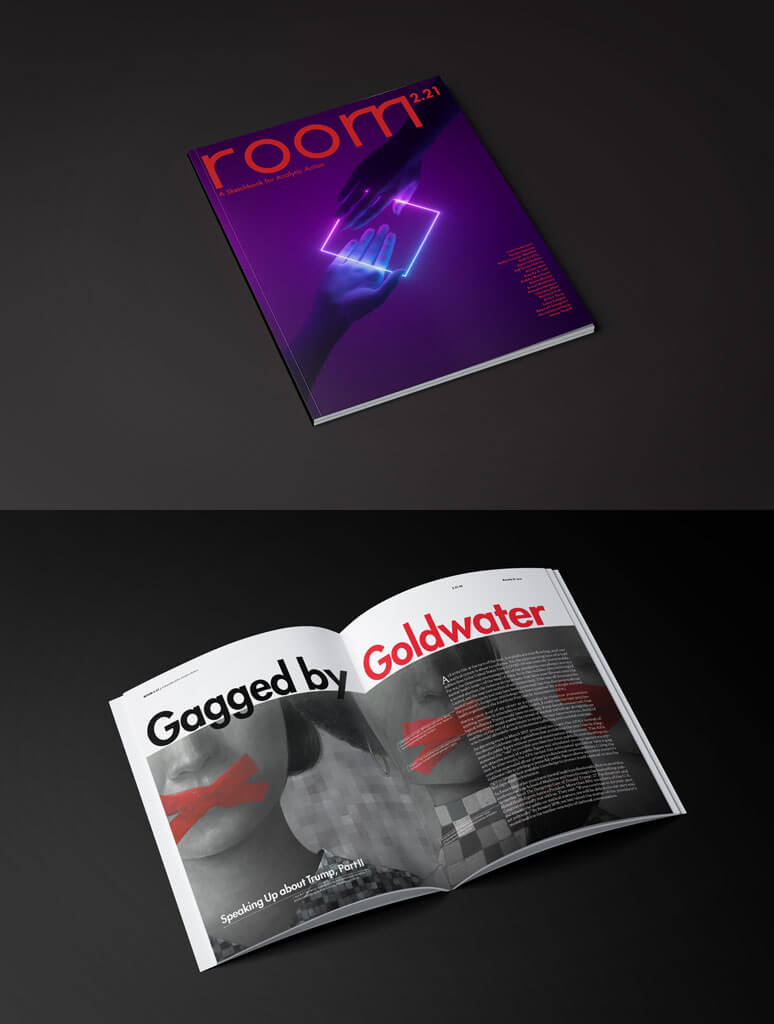
Available Worldwide!
ROOM 2.21
Released: March 2021
Editorial: Just Sayin’
“Radical openness does not mean that we empty our minds but that we open our minds to the prospect of losing the understandings to which we are attached.” So begins An Interview with Anton Hart. To be fair, though, perhaps “loosening attachments” when face to face with the trifecta of fascist racism, COVID, and environmental extinction may be near impossible. It’s a big ask if, in the midst of existential terror, we are holding on for dear life. The practice of radical openness is marbled with loss. It is an often lonely, sometimes violent, always singular stance. It exists between impossibilities. Two threads run through ROOM 2.21: the awareness of what it means to live between impossibilities, and how it feels to live with the violence of being cancelled or rendered nonexistent. Some authors dismantle our perception of time and space; others write of what belonging, or not belonging, has meant to them. (…)
Contributors
Luca Caldironi • Paula Coomer • Kelly Cressio-Moeller • Gail Griffin • Gjertrud Hals • Adrienne Harris • Anton Hart • Bandy X. Lee • Bobby Martinez • Kyrie Mason • Brent Matheny • Pamela Nathan • Christie Platt • Bartosz Puk • Betty Teng • Tuba Tokgoz • Raynell Sangster • David Stromberg • Tareq Yaqub • Caroline Volel
Distributors in Europe:
- Italy: https://www.ubuy.co.it
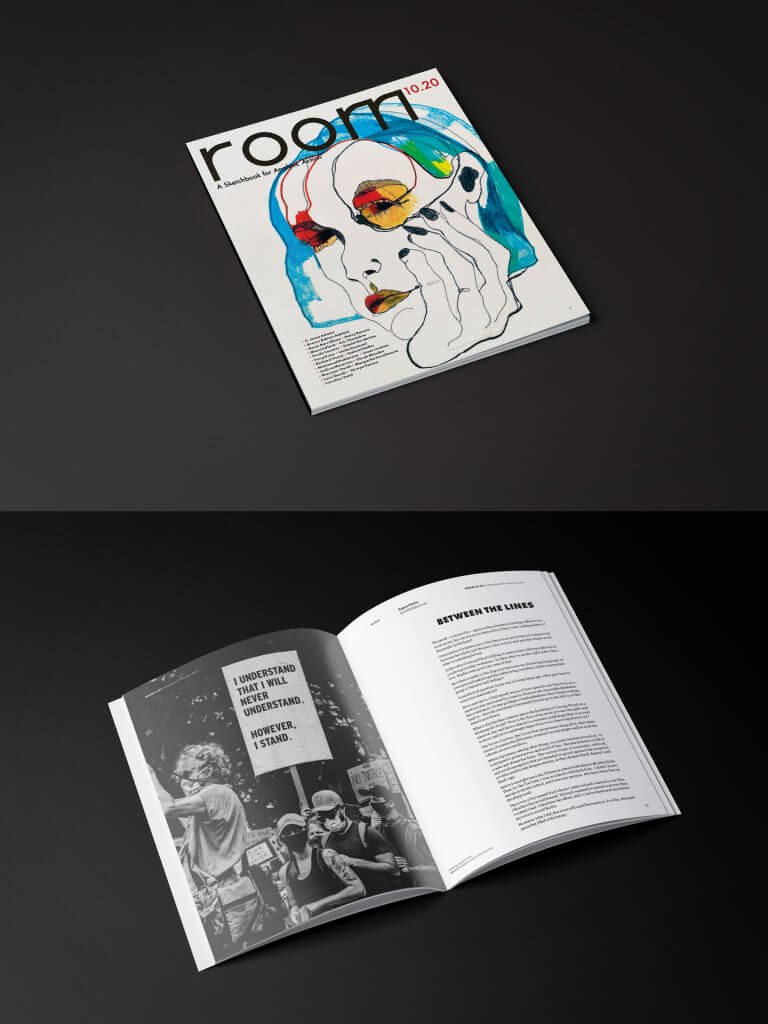
Available Worldwide!
ROOM 10.20
Released: October 2020
Editorial: Re-Vision
For Freud, nearing the end of his life, the fateful question for the human species came down to whether and to what extent our cultural development would succeed in mastering the disturbance our aggressive and self-destructive instincts inflict upon our communal life.
“Men,” he wrote in the last sentences of Civilization and its Discontents, “have gained control over the forces of nature to such an extent that with their help they would have no difficulty exterminating one another to the last man. They know this and hence comes a large part of their current unrest, their unhappiness, and their mood of anxiety. And now it is to be expected that the other of the two ‘heavenly powers,’ eternal Eros, will make an effort to assert himself in the struggle with his equally immortal adversary.” Eros’s immortal adversary, Thanatos, was life’s somber and inexorable drive toward death. Two years later, in 1931 as Hitler ascended to power, Freud went back to this paragraph and added one last line, “But who can foresee with what success and with what result? (…)
Contributors
C. Jama Adams • Aremu Adams Adebisi • Rocío Barcellona • Daisy Bassen • Marcia Black • Eric Chasalow • Paula Coomer • Daniel Derderian • Fang Duan • Linda Emanuel • Richard Grose • Gabriel Heller • Mohamad Kebbewar • Omer Leshem • Joshua Maserow • Dinah Mendes • Maryam Omidi • Margarita Serafimova • Lara Sheehi • Shreya Varma • Caroline Volel
Distributors in Europe:
- Italy: https://www.ubuy.co.it
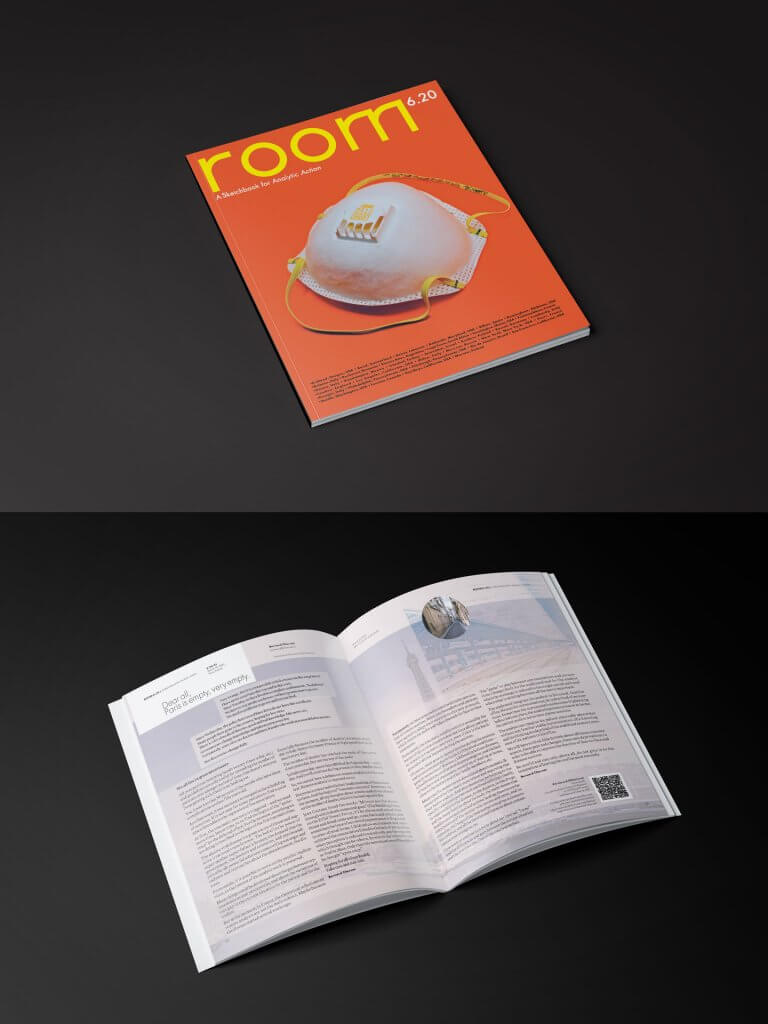
Available Worldwide!
ROOM 6.20
Released: July 2020
Editorial:
Psychoanalysis, art, and poetry make visible and expand the boundaries of our psychic reality and so the world. But what happens when those boundaries fracture? When we are on top of each other and oceans apart? When days merge and space contracts? When inner and outer reality converge on a pixilation screen? Just this. We must create a new path forward. (…)
Contributors
Julia-Flore Alibert • Daniela Andronache • Giuseppina Antinucci • Lee Ascherman • Stefania Baresic • Lesley Caldwell • Joseph A. Cancelmo • Bernard Chervet • Tiffany Chu • William F. Cornell • Viviane Chetrit-Vatine • Ronald Davies • Simonetta Diena • Michael Diamond • Miriam DeRiso • Cristina Escudero • Laura Ribeiro Ferreira • Yehuda Fraenkel • Elizabeth Goren • Joachim Kuchenhoff • Dinah Mendes • Kate Muldowny • Rosemarie Nassif • Marc Nemiroff • Justyna Pawłowska • Gianpiero Petriglieri • Juan Pinetta • Bartosz Puk • David Rosenfeld • Cosimo Schinaia • Gertraud Schlesinger-Kipp • Harvey Schwartz • Alice Lowe Shaw • Irina Sizikova • Julia Roy-Stablein • Manuela Tosti • Drew Tillotson • Elizabeth Trawick • Brian Wu • Ümit Eren Yurtsever • Carmen Cuenca Zavala • Poets: Kate Angus • Nan Cohen • Eugene Mahon • Marc Alan Di Martino • Amy Miller • Galit Hasan • Rokem • Jeneva Stone • Jeffrey Thomson • Artists: Enrique Enriquez • Linda Louis • Susan Luss • Rafael Silveira
Distributors in Europe:
- Italy: https://www.ubuy.co.it
- Netherlands: https://www.bol.com
- Sweden: https://www.bokus.com
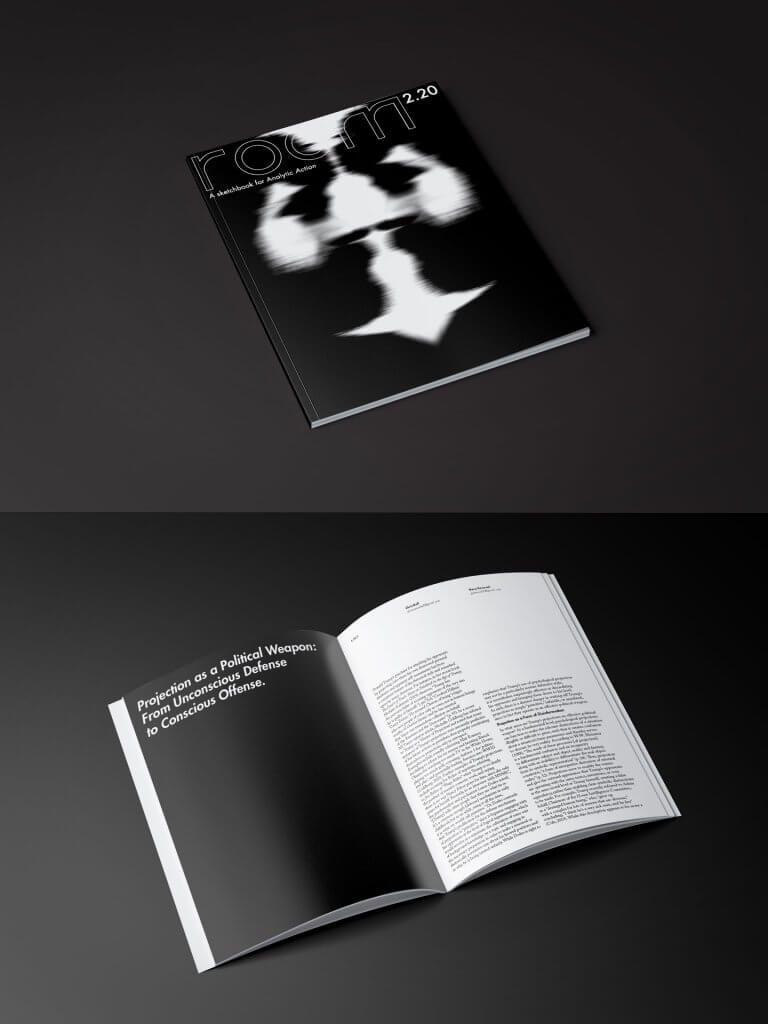
Available Worldwide!
ROOM 2.20
Released: February 2020
Editorial: Tremors
“To be stupefied,” Jared Russell explains in his provocative essay Stupidity, “is to regress in the face of the unexpected, to have one’s critical faculties paralyzed.” The contributors to ROOM 2.20 may be terrified and even heartbroken in the face of the unexpected, but they are not stupefied. They have some very clear ideas that we need to hear. They are telling us that we are living on a fault of our own making that is bigger than the San Andreas, and we are feeling the tremors. Each of these authors are telling us how, when facts and reason hold no sway, when fear, anger, and yes, even love render us numb or blind, we are failing spectacularly and tragically to live up to our humanity. (…)
Contributors
Sheldon Bach • Chris Bell • Daniel Benveniste • Ofra Bloch • Kate Daniels • Michael Diamond • Daniel José Gaztambide • William W. Harris • Michael McAndrew • Elizabeth Herman McKamy • Zak Mucha • Daniel Rosengart • Jared Russell • Gary Senecal • Aneta Stojnić • Juan Pablo Valdivieso Blanco
Distributors in Europe:
- Italy: https://www.ubuy.co.it


